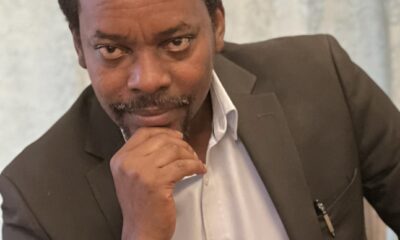Forgotten Dairies
Adanne Banana -By Dera Duru
He starts the ignition. Before I roll up the window, I look out one more time. The plump hawker is running across the road, to another vehicle. Tears fill my eyes, but there is a smile on my face as I pay silent homage to the memories of my Adanne, with her tray of blotchy-yellow bananas.

Forgive me, I may not be able to articulate this story, but I will say the much I recall. You see, there’s a part of Owerri called Warehouse. It is characterized by a clutch of desperate hawkers, running after careening vehicles. There is always a slow traffic there, drivers winding down to ward off the scrum of young boys who unceremoniously leap forward to wash the windscreens of their cars. It is the place where the gutters in Imo state are widest, where Mama had chosen to start her restaurant business after the death of Papa, saying, ‘The shop is in site. The market will move.’ It is also the place where I saw my Adanne for the last time.
Our landlady had come to tell Mama, in an impatient tone, to move her things out of the shop as fast as she could.
‘The governor is demolishing every structure along this part of the road in order to expand the road. We have been notified!’ She had said with finality. She was loud enough to draw my attention and that of Adanne. I stared at Adanne’s plump form as she struggled with the plates she washed. When our eyes met, she quickly averted hers. I mistakenly gave a customer toothpick instead of his change.
‘Hey!’ Mama whimpered. Her shoulders were beginning to quiver. ‘Just like that, no notice?’
The landlady spread her palms on her thighs resignedly.
Mama’s hand started to shake as well. She could not hold the plate of okra soup she had wanted to serve a customer. The plate left her grip and shattered on the ground. The soup sprawled thick on the tiled floor, shards of the broken plate stuck to it, like pins.
The first person to sense that something greater than panic had taken hold of Mama was my older sister, Adanne. She wiped her hands on her apron.
‘Mama, ogini?’ Adanne ran closer.
Mama held her chest, her eyes bereft of any color.
‘Mama,’ I joined. We held her sides as she sank to the floor and started jerking.
Our customers surrounded us. Suggestions filled the room, like a crowd. Sprinkle some water on her.
Make way for her to breathe. Lift her up. Adanne’s voice weaved in and out of the suggestions: ‘Mama, look at me. Don’t do this. Look at Emeka and Uche and Lilian.’
Mama was rushed to the hospital by some concerned customers. Adanne and the landlady went with them.
‘When Emeka and Uche come back from school, do not let them stay here. Take them home and close up, inugo?’ she instructed before leaving. Her voice was broken, and she sniffled intermittently.
I stared around, benumbed by what now seemed like the detritus of our shop: the fan Mama had bought newly, the lucent tiles, the steaming pots of soup balanced atop kerosene stoves, and the sight of customers leaving one after the other.
Adanne came home in the evening. There was a steeliness to her manner when she told our twin brothers that mama is a little bit sick and that she would be back in a few days, and then scolded Emeka when he started crying. She pulled me by the arm and steered me into our only room, where stacks of clothes took up more space than the bed.
‘Lilian, Mama has partial stroke. She can hardly move.’ She became misty-eyed. She sobbed deeply for a while. The news left me speechless, unable to think.
She wiped her face. ‘I used all the money we have to deposit for her treatment.’ Then she started sobbing again. ‘God, biko, help me. Help me. I can’t take care of my three younger ones. I have not even registered for WAEC yet, how do I get any kind of job?’ Her palms were pressed together.
I shed slow, helpless tears. And the rest of the night became a gloomy darkness only lit-up by the dancing half light of a candle.
When Mama returned home weeks later, she was a thinner, handicapped version of herself. She could neither use her hands and legs well, nor speak with the same old authoritativeness. Then Adanne became the new Mama.
‘Our shop has been crushed. If we continue folding our arms, we will all die of hunger. We all have to be doing something to feed until Uncle Kingsley sends help,’ she told me one rainy afternoon on our balcony.
I nodded. ‘What do you have in mind?’ I asked after a brief silence.
‘Bananas,’ she spoke gingerly. ‘I spoke to Oga Jude. He has helped my secure a space to mount my banana table on the road, opposite our former shop.
I will sell bananas and groundnuts there. I will also include bread and recharge cards. When you come back from school, you will sit by the shed while I go out with a tray of bananas and hustle.’ Tears crawled down her cheeks and she quickly wiped them off. A moment of silence slipped past. ‘I will try and raise some money for your WAEC.’
‘What about yours? We are both supposed to register.’
She smiled. ‘If both of us register, who will sponsor who?’ She looked forward, as if staring at the pool of stagnant water that had collected in front of our balcony.
So, every morning when Emeka, Uche and I went to school, our knapsacks on our backs, we would wave Adanne bye-bye as she lurched into the road with her tray of blotchy, yellow bananas and the groundnuts that lay a little distance from them on the tray, as if they meant to keep off. And in the afternoon, when school was over and sales were slow, I would come to Warehouse to spot Adanne running after moving vehicles, shouting and gesticulating enterprisingly, with a horde of other hawkers all darkened by the flaring sun. Whenever she came to tell me, ‘The cards are under the table. I will join you soon,’ the glint I would see in her eyes was not shame. It was defiance. It was care. It was determination. And she would run after a moving tricycle.
She gave me the WAEC registration fee a month later, crumpled naira notes that smelled like the bottom of a tinker box, and she said, ‘This is most of the money I have saved. Use it for your WAEC registration.’ On that same day, after I had thrust the money into the hands of the principal who muttered something about my late payment before taking down my data, after the tortuous hours of intensive lesson in school, I had gone home to give Emeka and Uche their lunch and to make sure Mama took her medication. Then I hurried back to Warehouse, to sit under our shed and beckon passersby to buy from me. But there were no passersby. Most people stood frozen at a particular spot, just further away, near a wide gutter. ‘Jesus!’ ‘That’s someone’s child!’ ‘Hey!’ were some of the exclamations I could make out.
I left my shed and ran towards the spot where the onlookers stood with shoulders and bodies joint together, as if stitched. I could not move through them.
‘What happened?’ I asked a woman at the back. Her eyes had reddened.
She turned. ‘Oh, see her sister!’ she announced.
‘Chai!’ some people chorused. The air was sedate.
My heart throbbed.
‘O gini, ma?’ I asked the woman. A tight pressure rose in my chest. She wiped off the tears in her eyes. The crowd made way for me as she led me to the center. And there, in the center of the crowd, lay Adanne’s body, swollen, discolored, lifeless.
‘Jesus! Adanne! Jesus!’ Strong arms grabbed me, but I fought and clawed. My throat burned. ‘Jesus! My jesus! My Jesus!’ These were the final words I remember shouting.
Forgive me, I might not be able to give you more details, like how I was told that Adanne, while rushing to sale bananas to a fast-moving vehicle had slipped and fallen into the wide gutter that brimmed with fast-flowing water, and drowned. I won’t really tell you how people had brought her out only too late. I won’t even tell you how the news had killed our sick mother, or how several months after, I wrote the WAEC exam and was the highest in the state, hence getting a scholarship from the government. I won’t begin to tell you where my twin kid brothers are at the moment, or that Uncle Kingsley never sent any help, but what you must know is that there was someone called Adanne, my big sister, and that she had sold bananas along Warehouse to pay for my future.
I’m currently in a taxi at that same spot in Owerri called Warehouse. A hawker with a tray of blotchy-yellow bananas is selling to me. I pick one bunch and overpay her. She counts the money while I look over her head, to the place where our shop had been. The road has not still been expanded and it has been five years.
‘Corper take. You overpaid me!’ the hawker said.
‘Keep the change I said.’ She smiled heartily. Why, she looked so much like Adanne, with her chubby body and dark skin. I think she is also about the same age Adanne had been, seventeen years or so. She hurries off with her heavy tray atop a mound of cloth on her head. My heart skips a beat. I hope she doesn’t slip and fall into the gaping mouth of the gutter.
‘Corper are you done?’ the taxi man asks.
‘Yes!’
He starts the ignition. Before I roll up the window, I look out one more time. The plump hawker is running across the road, to another vehicle. Tears fill my eyes, but there is a smile on my face as I pay silent homage to the memories of my Adanne, with her tray of blotchy-yellow bananas.
(RECENTLY, THE GOVERNOR OF IMO STATE DEMOLISHED PEOPLE’S HOMES AND SHOPS WITHOUT ADEQUATE NOTICE. I KNOW ONE OF THE FAMILIES WHO WERE AFFECTED BY THAT MASSIVE DEMOLITION, AND I KNOW HOW MUCH THEIR LIVES HAVE CHANGED AFTERWARDS)
Written By Dera Duru
Chidera Duru, author of the sound of war.

















